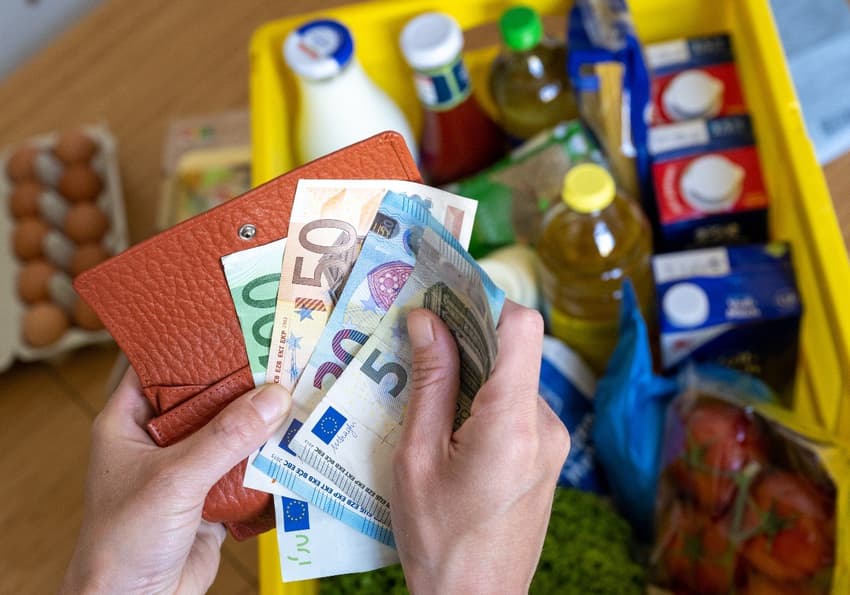Flights to shampoo: How life will get more expensive in Germany in 2024

Germany's government coalition has been scrambling to fill a €17 billion black hole in its finances for 2024. Some of that will fall on the backs of consumers meaning certain things will get more expensive next year.
With immense sums of money like €60 billion floating about, it can be easy to feel like the budget crisis of the past few weeks is something detached from our lives.
But when Olaf Scholz's coalition came to a last-minute agreement on finding €17 billion of lost borrowing in 2024, there were a lot of hidden shocks in there for consumers.
As well as cutting subsidies in order to make savings, the government is trying to boost its income with new taxation plans and a big hike in the CO2 tax next year.
Here's an overview of some of the things that could get more expensive under the new plans.
Flights
The cost of flying has already shot up over the past year due to increased energy costs in the wake of Russia's invasion of Ukraine. Under the coalition's budget plans, consumers could see yet another price hike - but potentially only for domestic flights.
That's because the government is planning to introduce a tax on the paraffin fuel used in air travel within Germany. Previously, airlines had been exempted from the tax as a means of supporting the aviation industry.
Eating out
Since July 2020, VAT on food products in restaurants and pubs has been set at just seven percent. The reduction was introduced in order to keep hospitality businesses afloat at the height of the Covid pandemic.
If you haven't noticed a drastic reduction in prices since then, it's because many businesses simply chose to keep prices the same (or even raise them) and simply net a higher margin.
READ ALSO: How Germany's plans to hike VAT in restaurants and cafes will affect you
From January 2024, however, VAT is set to be increased again to its normal rate of 19 percent, which experts believe restauranteurs will use as an excuse to raise their prices.

A group of friends eat at an Italien restaurant in Frankfurt am Main. Photo: picture alliance/dpa | Andreas Arnold
Groceries and toiletries
Products that come in plastic wrapping are likely to also see a jump in price from next year thanks to the government's planned tax on single-use plastics.
From January 1st, 2024, companies will be obliged to pay a levy into the single-use plastic fund managed by the Federal Environment Agency (UBA) - a cost they could well pass onto consumers.
If this happens, you can expect to dig a bit deeper in your wallet during your shop at DM or while picking up groceries at the supermarket, and you'll probably develop a very good awareness of just how much plastic there is out there.
READ ALSO: KEY POINTS: How Germany plans to solve its budget crisis in 2024
Petrol and diesel
One of the key ways the government wants to fund its climate protection plans is by raising to the CO2 tax from €30 to €45 per tonne. The tax on emissions is set to rise incrementally with each passing year, but was originally only set to rise to €40 in 2024.
According to motorists' association ADAC, this will add an additional 1.4 cents to the price of a litre of petrol on top of what was already planned. Taking the complete €15 hike into account, a litre of petrol will be around 4.3 cents more expensive than it was in 2023.
For drivers of diesel cars, it's a similar picture: the cost of a litre of diesel will rise by 4.7 cents in total due to the increase in the CO2 tax, a full 1.6 cents higher than originally planned.
Heating and electricity
Another area where the increase in the CO2 tax will be felt is in household energy bills - at least for the vast majority of people who use oil and gas to heat their home.
According to price comparison portal Check24, the increase to €45 per tonne of carbon dioxide will add around €60 per year onto an average household's gas bill. Price comparison website Verivox, meanwhile, calculated an increase of €96 per year for households who heat with oil.
Both websites used an average consumption of 20,000 kilowatt hours per year as the basis for their calculations.

A man turns up the thermostat on a radiator. Photo: picture alliance/dpa | Hauke-Christian Dittrich
In addition to this, the government is scrapping a planned €5.5 billion subsidy for network grid fees, meaning consumers will pay around 6.43 cents per kilowatt hour of energy in grid fees in 2024 - more than double the current 3.12 cents.
To make matters worse, the government is now ending its caps on gas, electricity and district heating three months earlier than planned, meaning consumers will be vulnerable to volatile energy prices from the start of the year rather than in April.
From March 1st, consumers will also be hit with a sudden hike in VAT on energy products to its normal rate of 19 percent, rather than the current seven. According to Check24, this alone will add €217 onto an average's household's annual spend.
In total, the portal estimates that the average family will spend around €2,537 on their gas bill in 2024 - a full 17 percent, or €370, more than in 2023.
READ ALSO: What you need to know about money and tax changes in Germany in 2024
E-cars and solar panels
Along with cutting climate-polluting subsidies, the government is also taking a scalpel to some of its more eco-friendly projects as a means of saving money next year.
These include generous bursaries for purchasing e-cars and subsidies to support the solar industry. Though e-cars may not necessarily go up in price, it will mean that most people pay more for them since they'll be unable to claim part of the cost back from the government.
The lack of support for the solar industry could also make it pricier to install solar panels on your roof, for example - though with eye-watering energy prices expected next year it could still be a smart move to do so.
How else will the budget affect my wallet?
Depending on your situation, the latest budget announcement could also be good news for your finances.
For benefits claimants, a planned €61 increase in Bürgergeld is set to stay, meaning recipients of long-term unemployment benefits will get at least €563 per month from next year.
However, Finance Minister Christian Lindner (FDP) has set he wants to find €1.5 billion of savings in social welfare, which he may achieve by tightening sanctions and cutting a €75 per month bonus for jobseekers who take training courses.
For families, a planned increase in tax breaks for parents is still set to go ahead, meaning the so-called Kinderfreibetrag will go up to €6,384 per child in 2024 - an increase of €360 compared to the current €6,024 per child.

The German Elster tax platform. Photo: picture alliance/dpa/dpa-tmn | Christin Klose
Since increases in the child tax allowance are normally following by increases in child benefit, there's speculation that an increase in the current €250 Kindergeld per child could also be on the cards.
What's more certain, however, is that the Family Ministry is still planning to package different types of financial support for parents into its Kindergrundsicherung, or basic child allowance, from 2025.
READ ALSO: What benefits are you entitled to in Germany if you have children?
Despite its financial woes, the government is still planning to find an additional €2.4 billion for this.
For employees, there's also some good news, since the tax-free allowance is set to be increased from €10,908 to €11,784 next year. That means workers will be able to earn almost twelve thousand euros - up to €1,000 per month - without paying a single cent of tax.
Comments
See Also
With immense sums of money like €60 billion floating about, it can be easy to feel like the budget crisis of the past few weeks is something detached from our lives.
But when Olaf Scholz's coalition came to a last-minute agreement on finding €17 billion of lost borrowing in 2024, there were a lot of hidden shocks in there for consumers.
As well as cutting subsidies in order to make savings, the government is trying to boost its income with new taxation plans and a big hike in the CO2 tax next year.
Here's an overview of some of the things that could get more expensive under the new plans.
Flights
The cost of flying has already shot up over the past year due to increased energy costs in the wake of Russia's invasion of Ukraine. Under the coalition's budget plans, consumers could see yet another price hike - but potentially only for domestic flights.
That's because the government is planning to introduce a tax on the paraffin fuel used in air travel within Germany. Previously, airlines had been exempted from the tax as a means of supporting the aviation industry.
Eating out
Since July 2020, VAT on food products in restaurants and pubs has been set at just seven percent. The reduction was introduced in order to keep hospitality businesses afloat at the height of the Covid pandemic.
If you haven't noticed a drastic reduction in prices since then, it's because many businesses simply chose to keep prices the same (or even raise them) and simply net a higher margin.
READ ALSO: How Germany's plans to hike VAT in restaurants and cafes will affect you
From January 2024, however, VAT is set to be increased again to its normal rate of 19 percent, which experts believe restauranteurs will use as an excuse to raise their prices.

Groceries and toiletries
Products that come in plastic wrapping are likely to also see a jump in price from next year thanks to the government's planned tax on single-use plastics.
From January 1st, 2024, companies will be obliged to pay a levy into the single-use plastic fund managed by the Federal Environment Agency (UBA) - a cost they could well pass onto consumers.
If this happens, you can expect to dig a bit deeper in your wallet during your shop at DM or while picking up groceries at the supermarket, and you'll probably develop a very good awareness of just how much plastic there is out there.
READ ALSO: KEY POINTS: How Germany plans to solve its budget crisis in 2024
Petrol and diesel
One of the key ways the government wants to fund its climate protection plans is by raising to the CO2 tax from €30 to €45 per tonne. The tax on emissions is set to rise incrementally with each passing year, but was originally only set to rise to €40 in 2024.
According to motorists' association ADAC, this will add an additional 1.4 cents to the price of a litre of petrol on top of what was already planned. Taking the complete €15 hike into account, a litre of petrol will be around 4.3 cents more expensive than it was in 2023.
For drivers of diesel cars, it's a similar picture: the cost of a litre of diesel will rise by 4.7 cents in total due to the increase in the CO2 tax, a full 1.6 cents higher than originally planned.
Heating and electricity
Another area where the increase in the CO2 tax will be felt is in household energy bills - at least for the vast majority of people who use oil and gas to heat their home.
According to price comparison portal Check24, the increase to €45 per tonne of carbon dioxide will add around €60 per year onto an average household's gas bill. Price comparison website Verivox, meanwhile, calculated an increase of €96 per year for households who heat with oil.
Both websites used an average consumption of 20,000 kilowatt hours per year as the basis for their calculations.

In addition to this, the government is scrapping a planned €5.5 billion subsidy for network grid fees, meaning consumers will pay around 6.43 cents per kilowatt hour of energy in grid fees in 2024 - more than double the current 3.12 cents.
To make matters worse, the government is now ending its caps on gas, electricity and district heating three months earlier than planned, meaning consumers will be vulnerable to volatile energy prices from the start of the year rather than in April.
From March 1st, consumers will also be hit with a sudden hike in VAT on energy products to its normal rate of 19 percent, rather than the current seven. According to Check24, this alone will add €217 onto an average's household's annual spend.
In total, the portal estimates that the average family will spend around €2,537 on their gas bill in 2024 - a full 17 percent, or €370, more than in 2023.
READ ALSO: What you need to know about money and tax changes in Germany in 2024
E-cars and solar panels
Along with cutting climate-polluting subsidies, the government is also taking a scalpel to some of its more eco-friendly projects as a means of saving money next year.
These include generous bursaries for purchasing e-cars and subsidies to support the solar industry. Though e-cars may not necessarily go up in price, it will mean that most people pay more for them since they'll be unable to claim part of the cost back from the government.
The lack of support for the solar industry could also make it pricier to install solar panels on your roof, for example - though with eye-watering energy prices expected next year it could still be a smart move to do so.
How else will the budget affect my wallet?
Depending on your situation, the latest budget announcement could also be good news for your finances.
For benefits claimants, a planned €61 increase in Bürgergeld is set to stay, meaning recipients of long-term unemployment benefits will get at least €563 per month from next year.
However, Finance Minister Christian Lindner (FDP) has set he wants to find €1.5 billion of savings in social welfare, which he may achieve by tightening sanctions and cutting a €75 per month bonus for jobseekers who take training courses.
For families, a planned increase in tax breaks for parents is still set to go ahead, meaning the so-called Kinderfreibetrag will go up to €6,384 per child in 2024 - an increase of €360 compared to the current €6,024 per child.

Since increases in the child tax allowance are normally following by increases in child benefit, there's speculation that an increase in the current €250 Kindergeld per child could also be on the cards.
What's more certain, however, is that the Family Ministry is still planning to package different types of financial support for parents into its Kindergrundsicherung, or basic child allowance, from 2025.
READ ALSO: What benefits are you entitled to in Germany if you have children?
Despite its financial woes, the government is still planning to find an additional €2.4 billion for this.
For employees, there's also some good news, since the tax-free allowance is set to be increased from €10,908 to €11,784 next year. That means workers will be able to earn almost twelve thousand euros - up to €1,000 per month - without paying a single cent of tax.
Join the conversation in our comments section below. Share your own views and experience and if you have a question or suggestion for our journalists then email us at [email protected].
Please keep comments civil, constructive and on topic – and make sure to read our terms of use before getting involved.
Please log in here to leave a comment.